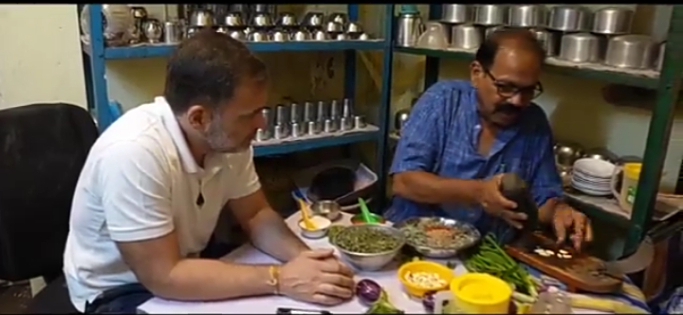Understanding Dalit Kitchen: A Journey Through Forgotten Flavors
Rahul Gandhi visits Dalit family as even today, very few people truly understand the cuisine of the Dalit community. As Shahu Patole Ji rightly said, “Dalit kya khate hain, koi nahin janata” (Nobody knows what Dalits eat). His statement reflects a larger societal disconnect—an ignorance about the cultural heritage of Dalit food, which is deeply rooted in history and survival.
With curiosity sparked by Patole Ji’s words, Rahul Gandhi spent an afternoon with Ajay Tukaram Sande Ji and Anjana Tukaram Sande Ji in their home in Kolhapur, Maharashtra. “They warmly invited me to witness and participate in their kitchen, offering a rare glimpse into a tradition often overlooked. Together, we prepared Chane ke Saag ki Sabzi (gram greens) and Brinjal with Tuvar Dal, simple yet hearty dishes that are staples in their daily lives. The flavors were rich, earthy, and nourishing—reflecting the resourcefulness of a community that has long had to make do with what little they had”.
“As we cooked, the conversation turned to caste and discrimination—issues that remain central to the Dalit experience in India. Ajay and Anjana spoke of the isolation they have faced, not just socially but also culturally. Dalit cuisine, despite being a fundamental part of India’s food history, remains largely undocumented and misunderstood. The food they eat is often associated with poverty and exclusion, yet it holds within it a story of resilience, innovation, and identity” – Rahul Gandhi said.
“People don’t realize that Dalit food is not just about scarcity,” Ajay explained. “It’s about community, sharing, and survival.” Patole Ji has often emphasized the importance of documenting Dalit food culture, not just as a culinary curiosity but as a means to preserve a history that is at risk of being forgotten.
“The conversation also touched on the broader struggles of the Bahujan community. Though the Constitution of India grants rights and protections to Bahujans, the road to true inclusiveness remains long” – Rahul Gandhu.
“We will protect that Constitution,” Ajay said with conviction, “but real equality will only be possible when every Indian strives to embrace the spirit of brotherhood.”
“The afternoon I spent with the Sande family wasn’t just about food; it was a reminder of the deeper work that still needs to be done to bridge the gaps between communities. Understanding and respecting Dalit cuisine is one small step toward achieving the inclusiveness that our society so desperately needs” – Rahul Gandhi.
